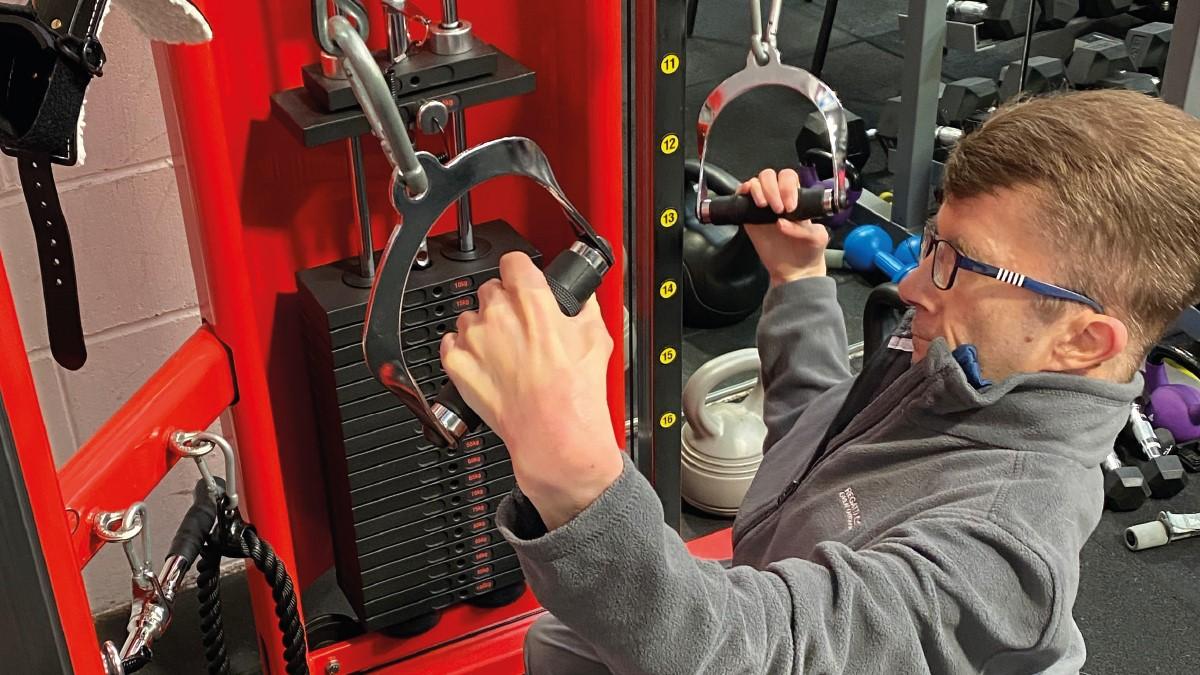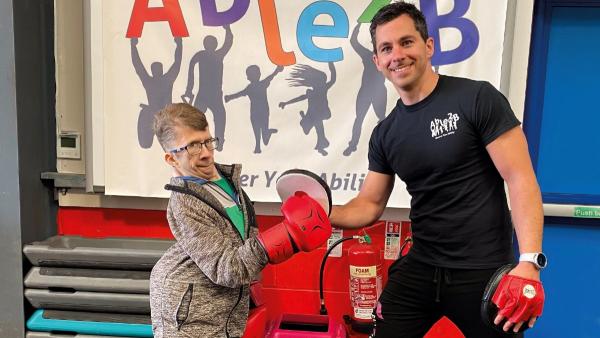Martin Symons shares how physiotherapy guidance, access to a community-based specialist disabled gym has helped to improve his fitness

I was born with Klippel Feil Syndrome – a rare skeletal disease characterised by abnormal fusion of two or more vertebrae. Features include a short, webbed neck, restricted mobility of the upper spine and a low hair line. I also have severe Kyphoscoliosis, growth hormone deficiency and aplastic anaemia. I saw an orthopaedic consultant in my childhood until I was 18, when I was discharged. It was decided not to perform surgery as I wasn’t having any problems.
I was a very physically active person up to my early 30s and enjoyed horse riding, walking, rock climbing and canoeing until I had respiratory failure, caused by pneumonia, in 2001. These activities had been my way of keeping fit and mobile as well as fulfilling my love for outdoor pursuits.
After I became ill, I lost a lot of muscle tone and was quite weak. I had to learn to walk and eat again owing to spending six weeks in intensive care.
In 2016, I was referred to the scoliosis team at the Norfolk and Norwich University hospital as I noticed my condition was getting worse. Strangely, unlike when I heard stories from others with scoliosis, I didn’t suffer much pain. As a result, there was nothing the doctors could do because of my other problems. Their only option would have been to break my spine in several places, which would have resulted in many weeks in hospital assuming I survived the operation!
It was agreed that the best course of action was to have a mould for my wheelchair, which I used for getting from A to B.
However, a permanent hard mould was not the solution, as a wheelchair technician said my spine was too flexible. Use of a soft square block with Velcro was a better option, so it could be moved as my shape changed.
The priority was then to maintain my remaining mobility.
Massage therapy is something that works well for me, both physically and mentally as well as helping me to relax. I went to the gym on odd occasions but that did not really work out. I saw an NHS physio once, but I only got six weeks and with the best will in the world, I didn’t keep up the exercises. It was a motivational thing – or lack of!
In September 2019, I found out about a community interest company in Norwich, called Able2B, that provides fitness sessions such as boxing and other activities for disabled adults and children and those with long-term health issues so I booked a consultation with its physiotherapist Scott Rowbotham.
Physical and mental benefits
This is not what I believe is your conventional physio. It is like going to the gym but with a personal trainer who works with you for an hour, guiding you through strength and conditioning exercises which, over time, enable you to improve your overall fitness, stamina and well-being. This does cost but you must decide what’s important to your wellbeing.
An example of my workout includes: medimotion arm and leg cycle, Kbox squats, Kpulley deadlifts, fixed K08 squats, fixed K08 lunges, step ups onto high step left and right leg, and ski ergometer. I’ve also started to do shadow boxing.
In November 2019, I saw my respiratory consultant and my spirometer test (a measure of lung function) showed that it was the best it had been since 2015, so he encouraged me to continue with my exercise regime.
During the first lockdown, sessions stopped so I wasn’t able to exercise as much. The gym, Able2b, had to close. But they managed to arrange some activities online using Zoom, starting with boxing and then gradually introducing Pilates, relaxation and general exercise classes. I occasionally took part in the boxing and the relaxation classes. Other than that, I spent five months isolating.
I started back again in July 2020 as 1-to-1 sessions were then allowed, but groups continued online. Then the second lockdown came, but Scott, being a physiotherapist, was able to continue to work - but only on a 1-to-1 basis and following Covid-19 guidelines.
This was great news as I’m not sure I could have coped with another four weeks of isolation. Going to the gym is not just about the physical side of things; it’s also beneficial for my mental wellbeing, especially during lockdown.
I believe that finding a specialist disability gym that provided online and in-person exercise therapy really helped with both my mental and physical wellbeing. I was able to continue socialising online, during a lengthy period of isolation due to my health conditions, and the gym itself has given me a focus and activity to enjoy whilst avoiding public places. And the bespoke exercise regime has benefited my physical health, as shown by the lung function tests and strength improvements.
Person-centred adapted exercise
Martin’s physio at Able2B, Scott Rowbotham, says: ‘It has felt hugely positive and very rewarding to be able to provide virtual and in-person exercise therapy sessions to those in need the most over the course of the pandemic. Our clinic’s virtual exercise sessions were set up within days of the first lockdown and brought friendships together among people who had not met

before, and a supportive community for those suddenly needing to shield and were feeling very isolated.
It was brilliant to see Martin access seated exercise sessions and relaxation sessions as well as communicate with others in a similar situation.
He has worked hard on improving his strength, balance, aerobic fitness and even short running drills to improve his functional ability and quality of life.
And regular dialogue has also allowed every session to be adapted depending on how well Martin is. This allows us to increase or decrease the intensity of the session, utilising the specialist equipment we have, so we can ensure each session is optimal for his needs.
From a health perspective it has been fantastic to see his health markers improve through consistent adapted exercise and improve his confidence to take part in physical exercise that would normally be avoided without a dedicated specialist disability gym set up, as well as specialist personal trainers, doctors and physiotherapists to support his needs.’
Number of subscribers: 1
